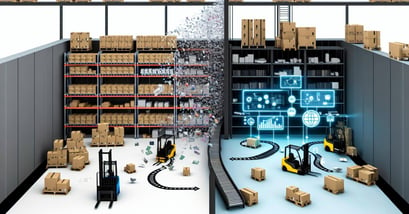AI-Powered Supply Chain Inventory Optimization
As a Supply Chain Manager in this industry, you understand the critical role inventory optimization plays in meeting demand, controlling costs, and ensuring the timely delivery of life-saving products. The integration of AI-powered solutions into supply chain management has revolutionized traditional practices, offering unprecedented insights and agility.
In this blog, we look into the realm of AI-powered inventory optimization, exploring its benefits, challenges, and the integration potential with leading ERP, SCM, and MES systems like PlanetTogether and SAP, Oracle, Microsoft, Kinaxis, Aveva, among others.

AI-Powered Inventory Optimization
AI-powered inventory optimization leverages advanced algorithms, machine learning, and predictive analytics to enhance decision-making across the supply chain. By analyzing historical data, market trends, and various external factors, AI models can accurately forecast demand, identify optimal inventory levels, and streamline replenishment processes. This proactive approach minimizes stockouts, reduces excess inventory, and optimizes working capital, ultimately driving profitability and customer satisfaction.
Benefits of AI-Powered Inventory Optimization:
Enhanced Forecasting Accuracy: Traditional forecasting methods often fall short in capturing the complexity of demand patterns in medical manufacturing. AI algorithms excel in analyzing vast datasets and identifying subtle trends, resulting in more accurate demand forecasts. This precision enables organizations to align production and inventory levels with actual market demand, reducing the risk of overstocking or understocking.
Optimized Inventory Levels: Maintaining the right balance of inventory is critical in medical manufacturing, where product shelf life and regulatory compliance are significant concerns. AI-powered solutions continuously evaluate demand fluctuations, supply chain constraints, and lead times to determine optimal inventory levels across the network. By minimizing excess inventory while ensuring sufficient safety stock, organizations can reduce carrying costs and improve operational efficiency.
Improved Supply Chain Visibility: Real-time visibility into inventory levels, production capacity, and supplier performance is essential for effective decision-making. AI-driven supply chain platforms provide comprehensive visibility across the entire supply chain, enabling stakeholders to anticipate disruptions, mitigate risks, and capitalize on opportunities. This transparency fosters collaboration among internal teams and external partners, driving agility and responsiveness.
Dynamic Replenishment Strategies: Traditional inventory replenishment strategies often rely on static parameters and periodic reviews, leading to suboptimal outcomes. AI-powered systems employ dynamic replenishment algorithms that adapt to changing demand patterns, market dynamics, and supply chain constraints in real-time. By optimizing order quantities, replenishment frequencies, and distribution strategies, organizations can minimize stockouts, improve order fulfillment rates, and enhance customer satisfaction.
Continuous Improvement: AI-powered inventory optimization is not a one-time endeavor but a continuous journey of improvement. These systems leverage feedback loops and historical performance data to refine forecasting models, fine-tune inventory policies, and identify areas for optimization. By embracing a culture of continuous improvement, organizations can stay ahead of market dynamics and drive sustainable growth in the long run.

Challenges and Considerations
While the benefits of AI-powered inventory optimization are compelling, several challenges must be addressed to maximize its effectiveness:
Data Quality and Integration: The accuracy and reliability of AI models heavily depend on the quality and availability of data. Supply Chain Managers must ensure seamless integration between AI platforms and existing ERP, SCM, and MES systems to access relevant data across the supply chain. This requires standardized data formats, robust APIs, and efficient data governance processes.
Model Interpretability: AI algorithms often operate as black boxes, making it challenging to interpret their decisions and recommendations. Supply Chain Managers must strike a balance between algorithmic complexity and interpretability, ensuring that stakeholders can trust and understand the insights generated by AI models. Explainable AI techniques can help demystify model outputs and facilitate informed decision-making.
Change Management: Implementing AI-powered inventory optimization requires a cultural shift within the organization. Supply Chain Managers must communicate the benefits of AI adoption, address concerns about job displacement, and provide training to employees on new tools and processes. Effective change management strategies are essential to drive acceptance and adoption across the organization.
Regulatory Compliance: In the highly regulated environment of medical manufacturing, compliance with industry standards and regulations is non-negotiable. Supply Chain Managers must ensure that AI-powered solutions adhere to data privacy regulations, quality standards, and traceability requirements. Robust compliance frameworks and risk mitigation strategies are essential to safeguard patient safety and maintain regulatory compliance.

Integration with PlanetTogether and Leading ERP, SCM, and MES Systems
Integration between AI-powered inventory optimization platforms like PlanetTogether and leading ERP, SCM, and MES systems such as SAP, Oracle, Microsoft, Kinaxis, and Aveva offers a synergistic approach to supply chain management. By leveraging the strengths of both systems, organizations can unlock new levels of efficiency, visibility, and agility across the supply chain:
Seamless Data Exchange: Integration enables seamless data exchange between AI-powered inventory optimization platforms and existing ERP, SCM, and MES systems. This bidirectional flow of information ensures that AI models have access to real-time inventory data, production schedules, and demand forecasts, enabling more accurate decision-making.
Unified Planning and Execution: Integrating AI-powered inventory optimization with ERP, SCM, and MES systems enables unified planning and execution processes. Organizations can leverage AI-driven insights to optimize production schedules, procurement plans, and inventory levels while ensuring alignment with strategic business objectives and customer demand.
Automated Workflows: Integration enables the automation of key supply chain workflows, from demand forecasting and inventory replenishment to production scheduling and order fulfillment. By eliminating manual intervention and streamlining processes, organizations can reduce lead times, minimize errors, and improve overall operational efficiency.
Real-time Visibility and Collaboration: Integrated systems provide real-time visibility into inventory levels, production status, and supply chain performance metrics. This visibility facilitates collaboration among cross-functional teams, suppliers, and customers, enabling proactive decision-making and rapid response to changing market conditions.
Scalability and Flexibility: Integration between AI-powered inventory optimization platforms and leading ERP, SCM, and MES systems offers scalability and flexibility to accommodate evolving business needs. Organizations can seamlessly scale operations, expand into new markets, and adapt to changing demand patterns while leveraging the combined capabilities of integrated systems.
In the era of AI-powered supply chain management, inventory optimization emerges as a strategic imperative for medical manufacturing facilities. By harnessing the power of AI algorithms, machine learning, and predictive analytics, organizations can enhance forecasting accuracy, optimize inventory levels, and improve overall supply chain performance. Integration between AI-powered platforms like PlanetTogether and leading ERP, SCM, and MES systems enables organizations to unlock synergies, streamline processes, and drive innovation across the supply chain.
As Supply Chain Managers, embracing AI-powered inventory optimization is not just a competitive advantage but a necessity to thrive in the rapidly evolving landscape of medical manufacturing.
Are you ready to take your manufacturing operations to the next level? Contact us today to learn more about how PlanetTogether can help you achieve your goals and drive success in your industry.
Topics: Inventory Optimization, Seamless Data Exchange, Real-time Visibility and Collaboration, Enhanced Forecasting Accuracy, Automated Workflows and Alerts, Scalability and Flexibility, Unified Planning and Execution, Medical Manufacturing, AI-Powered Inventory Optimization




















LEAVE A COMMENT